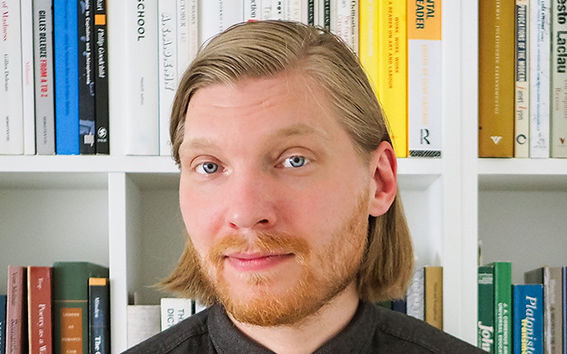Juuso Tervo wins 2018 Manuel Barkan Memorial Award for art education

The National Art Education Association (NAEA) of the United States has granted Aalto University alumnus and postdoctoral researcher Juuso Tervo the 2018 Manuel Barkan Memorial Award. The prestigious award recognizes an outstanding NAEA member who through their published work in either Art Education or Studies in Art Education, has contributed a product of scholarly merit that deals carefully and imaginatively with an important issue. The award was presented at the NAEA National Convention in Seattle, Washington, on March 23, 2018.
The selection committee noted, "This award is being given to recognize excellence in professional accomplishment and service by a dedicated art educator. Juuso Tervo exemplifies the highly qualified art educators active in education today: leaders, teachers, students, scholars, and advocates who give their best to their students and the profession".
Tervo graduated from Aalto University in 2011 and received his Ph.D. from The Ohio State University in the United States in 2014. He now works at Aalto University as a Postdoctoral Researcher and a Project Coordinator for the University Wide Art Studies (UWAS).
Tervo told about his thoughts, work and research to Aalto University communications.
What does the NAEA Award mean to you?
The award is a great honor, especially because it was my first full-length article that I didn’t draw from my dissertation. For me it was a point of entrance to the historical research in art education, which has strong traditions in our field. It went through a number of revisions because it was not first considered a proper historical study. It was kind of funny that the award came to an article whose path to publication was anything but straightforward.
What was your article about?
Instead of an actual archival work, the article focuses on the discussions around historical research in 1980-1990s. The article is titled "Always the New: Paradigms and the Inherent Futurity of Art Education Historiography" and it was published in the Studies in Art Education journal. It is essentially an attempt to try to better understand the concepts of "paradigm" and "paradigm shift" in the art education research.
Could you explain this a bit?
While this might seem like a small semantic issue, it’s connected to central questions of how to read the history of education and how to look at the historicity of the present. My central thesis is that art education historiography has heavily relied on an understanding of time in which historical consciousness "saves" the future from the past. The problem with this kind of progressivist thinking is that it imposes a very strict framework for historiography. In short, I could say that the aim of the article is to try understand historiography in a different way - not merely as a critique of memory but a critique of time.
Do theory and practice meet in your research?
These questions are not merely theoretical – they can also have an impact on very practical curriculum planning. Instead of starting from defining what art education should do, I am more interested in the event of education itself, that is, what is taking place
when learning and teaching happens. There’s a big difference between approaching education as straightforward process of change from A to B (e.g. from an uneducated to educated) and seeing it as a constellation of different events and actors without a specific
endpoint. Of course, these are not mutually exclusive approaches. My interest lies particularly in the educational activity that does not solely belong to either of these categories.
You also received a NAEA award previously for your doctoral dissertation. What was it about?
My dissertation was a theoretical investigation of the societal role of art education in which I reflected recent research literature with the writings of two contemporary philosophers,
Jacques Rancière and Giorgio Agamben, and their approaches to political philosophy. My main finding was that the discussion on the societal role of art education is marked by the desire to be more closely involved with society without questioning this involvement in itself.
I could roughly summarize it by saying that social criticism always requires also self-criticism, and that instead of trying to improve the world through art education, we could also try to change it. I received NAEA’s Elliot Eisner Dissertation Award in Art Education Award for my dissertation in 2015, which was a similar surprise as this award now.
What interesting is going on with the UWAS studies at the moment?
My job includes, among other things, developing the contents as well as the pedagogical thinking of UWAS. We are just about to wrap up the course portfolio for the academic years 2018-2019 and 2019-2020 and we are also participating in further developing of Aalto's multidisciplinary studies. We will have very interesting courses for the next two years and I am looking forward to see them in practice.
You are also doing research alongside your job. What is your research about?
At the moment, I am writing two articles on the ethics of art education for two different books. I am also working on one article with my colleague
Kevin Tavin and finalizing a small publication on the philosophy of education and love for the University of Cologne. In addition, I am working on a book project on literary entanglements of education and life in the European educational thought from pre-modern to modern time. Visual Arts Research journal will publish my article on the philosophy of historical research in art education this spring, where I will continue with the theme of this award-winning article.
For more information:
Juuso Tervo, PhD, Postdoctoral Researcher, Project Manager for University Wide Art Studies (UWAS)
Aalto University
School of Arts, Design and Architecture
Tel. +358 50 407 7837
juuso.tervo@aalto.fi






